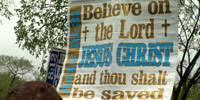In This Episode << SLIDE LEFT TO SEE ADDITIONAL SEGMENTS
BOOK EXCERPT Believers: A Journey Into Evangelical America
Read an excerpt from BELIEVERS: A JOURNEY INTO EVANGELICAL AMERICA (Viking, 2006) by Jeffrey L. Sheler:
 Rick Warren loped onto the stage from somewhere near the rear, looking thoroughly relaxed in a blue-and-white Hawaiian shirt, khakis, and brown deck shoes. He is a large man with a goatee and spikey brown hair that shows surprisingly little gray for someone fifty-two years of age. His smiling face filled the giant screens as he took his place behind a polished wooden pulpit at the center of the stage.
Rick Warren loped onto the stage from somewhere near the rear, looking thoroughly relaxed in a blue-and-white Hawaiian shirt, khakis, and brown deck shoes. He is a large man with a goatee and spikey brown hair that shows surprisingly little gray for someone fifty-two years of age. His smiling face filled the giant screens as he took his place behind a polished wooden pulpit at the center of the stage.
“Good morning, everybody. Good to see you, and welcome to Saddleback.” He turned and looked directly into a camera perched on a platform in the center of the auditorium. “I want to welcome those of you who are in the Overdrive venue, and those of you who are in the Praise venue, and those of you who are at El Encuentro, or who are up there in the Terrace Cafe, or wherever you are — we’re glad you’re here. And now if you’ll take out your message notes, we’re going to talk about making a difference with your life.”
It is Warren’s style to get down to business quickly. Alan Wolfe, a noted Boston College political scientist who has written often and incisively about American evangelicals, once described Warren as “not only the best preacher, but simply the best public speaker I have ever heard.” No doubt a big part of what impressed Wolfe and others is Warren’s uncanny knack for simplifying and clarifying complex subjects. Both in the pulpit and in his books he prefers storytelling to scholarly exegesis, and is fond of using lists and easy-to-remember alliterations to communicate a point. The purpose of life, for example, as he famously explains in his bestseller [THE PURPOSE-DRIVEN LIFE, Zondervan, 2002] may be easily summed up in five bullet points. (“You were planned for God’s pleasure. You were formed for God’s family. You were created to become like Christ. You were shaped for serving God. You were made for a mission.”) So, too, the secrets of building a strong and vibrant CHURCH. Midway through this morning’s message Warren would reassure his flock that there was nothing to fear about engaging in mission work. “It’s not about location; it’s about dedication. It’s not about where you are; it’s about who you serve. It’s not about crossing the sea; it’s about seeing the cross.” It was classic Warren-speak.
“God designed you to make a difference,” he gently admonished his listeners at the outset of his message. “He didn’t put you on this planet just to take up space. You’re not here just to use resources, breathe, and die. God intends for you to make an impact with your life. He wants you to leave the world a better place than you found it. And the only way you do that is by serving other people. No one has ever left the world a better place by being selfish or living for themselves. Jesus said, ‘You want to be great? Learn to be a servant of all.'”
On this weekend Warren was unveiling his latest and undoubtedly his most ambitious project to date: a worldwide Saddleback-led campaign to battle the “global giants” of poverty, disease, ignorance, egocentric leadership, and spiritual emptiness. He called to the PEACE Plan — an acronym based on five strategies he said were drawn from the teachings of Christ: Planting churches, Equipping servant-leaders, Assisting the poor, Caring for the sick, and Educating the next generation. For the next forty days Saddleback members would study the strategies and begin applying them, first locally, and then globally. This was to be the “beta version” of the PEACE Plan, and after a year of testing and adjusting, it would be rolled out as an international campaign involving thousands of churches and millions of Christians around the world. Warren called it “a revolution that will ignite a second Reformation.”
It was an unabashedly grandiose undertaking to say the least, and as such, it was vintage Warren. In his twenty-five years in the ministry no one had ever accused him of thinking small. Shortly after he arrived in Southern California with his young family in 1979, fresh out of seminary, Warren audaciously announced to a handful of worshipers that the church they were starting from scratch would one day number twenty thousand and would occupy a fifty-acre campus. Early in 2005 they surpassed that goal and held a celebration service at Angel Stadium in Anaheim. Saddleback was now one of the three largest churches in the nation, with a paid staff of over three hundred and an annual operating budget of more than $30 million.
Warren spoke for about thirty minutes and then stepped away from the pulpit while a troupe of actors performed a humorous skit to illustrate one of his sermon points. When he came back he addressed the “fear factor” — the reluctance that he said some people may feel about participating in the PEACE Plan. “You may be sitting there saying, ‘But it just seems so big and so overwhelming. Why us?’ I would say to you the same thing Jesus Christ said in Matthew 19:26: ‘Humanly speaking it is impossible. But with God everything is possible.’ I would rather attempt something great and fail than attempt to do nothing and succeed. Throughout the history of the world, in God’s timing there are always three phases: impossible, possible, and done. Everything is considered impossible until somebody does it. And God wants to use you.”
Warren repeated the same message at each of the weekend services, and after each service members queued up in long lines on the outdoor plaza to pick up information kits and study materials for the 40 Days of PEACE campaign. The revolution was under way.






